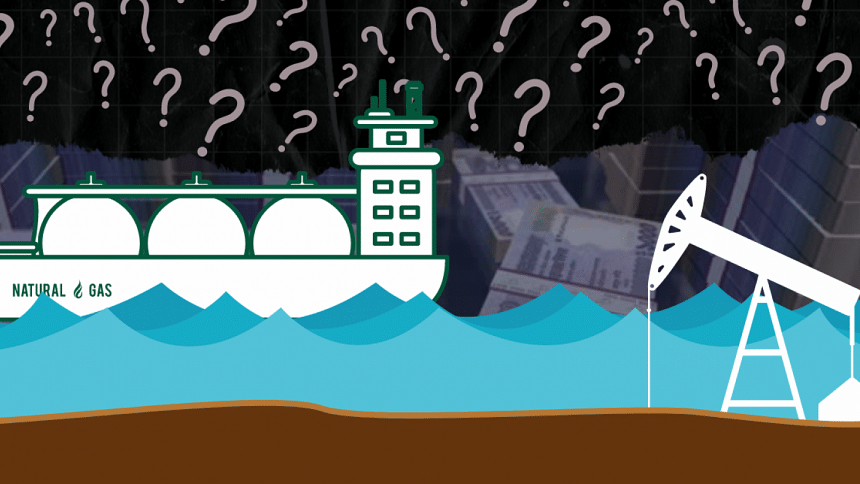Bangladesh’s chronicle of shoddy gas exploration

In the 1960s, the discoveries of five large gas fields, by international oil company Shell, placed Bangladesh in the list of gas-rich provinces. However, this was not followed by similar exploration successes in later years. Exploration remained behind for decades to follow. Chronically poor exploration in a prospective gas-rich country means the gas supply remains below demand and the industrial and economic growth are consequently held back. And, in the 22 years after 2000, Bangladesh drilled 26 exploratory wells – a mere one well per year on average. The above record has given way to one of the least explored hydrocarbon basins in the world.
Realising that increasing dependence on imported LNG renders gas supply vulnerable to unpredictable economic shocks, the government has lately decided to ramp up exploration and development of its own gas in the country. This move, late but better than never, is welcome because of the fact that geoscientists have long been suggesting that significant gas resources still remain underground in the country, and the present gas demands may well be met through extracting our own gas. Experts opine that Bangladesh could stay put on the import of LNG for several years until its own gas resources are exhausted.
In August 2022, Petrobangla, the government agency for oil and gas exploration, production, and transmission, announced a programme for drilling 46 wells in three years (from 2022 to 2025). These include 17 exploratory wells, 12 development wells, and 17 workover wells. When drilled, these wells could reportedly produce 618 million cubic feet of gas per day (mmcf/d) by 2025. This is equivalent to the amount of gas imported in the form of LNG at present.
To put it simply: a) an exploration well, if successful, adds new gas fields and reserves to the country; b) a development well refers to a well drilled in an already known gas field to enhance the gas production of that field; and c) the workover well refers to a discovered but abandoned well that stopped production previously but will now be "worked over" to extract any leftover gas using repairment and readjustment.
In February 2023, just six months after its announcement, Petrobangla rescheduled the programme of drilling the 46 wells by reducing its timeframe by one year – meaning the 46 wells will now be drilled over two years instead of three years. So, five of the exploratory wells will be drilled in 2023 and 12 will be drilled in 2024. Given that Bangladesh currently drills about one well per year, aiming to drill 12 exploratory wells in a year is certainly ambitious. One may well wonder what's so wrong with being ambitious.
It was some time ago that Petrobangla had announced another programme of drilling 108 wells in the five years between 2016 and 2021. Among these, 55 wells were supposed to be exploratory (meaning 11 exploratory wells per year). But this programme, which received a lot of media attention, has failed to be implemented and was scrapped.
Bapex, the exploration wing of Petrobangla, has the capacity of drilling three wells per year under its present logistical and technical manpower support. So, to drill 12 exploration wells in one year, the programme plans to outsource the drilling job. This may seem logical, but how practical would it be to outsource the drilling of so many wells in a single year? There were managerial issues that went seriously wrong during the previous round of outsourcing the drilling of wells. Often, the arrangement ended in conflict, complaints, and even with international lawsuits running for years.
The drilling of the Begumganj-4 well, for instance, was outsourced to the state oil company of Azerbaijan, Socar. The latter entered into financial and managerial conflict with Bapex and the situation turned so bad that Socar left the country without drilling the well and both parties ended up at international court against each other. The case is still pending and the Begumganj well cannot be drilled by Bapex until the case is resolved. A similar lawsuit is active at the International Centre for Settlement of Investment Disputes (ICSID) between Bapex and Canadian company Niko with respect to drilling in Chattak gas field. Niko carelessly blew up the well and Bangladesh took the company to court for compensation. This case has been running for 17 long years, with Bapex not being able to produce gas from the Chattak field until the case is settled. This is despite the fact that Bangladesh is quite starved for gas and has had to resort to buying from the very expensive LNG market.
Another criticism of outsourcing well-drilling is that foreign companies are often given undue privilege by Bangladesh. Gazprom, for example, is engaged in drilling several of Bapex's wells at a cost more than double what it would have cost for Bapex to drill the wells.
Rescheduling the programme of drilling 46 wells to complete in only two years is not considered wise or practical by technical people in Bapex. Such decisions are presumed to be imposed on Bapex by people from higher up in the administration who do not have a good idea of the practicality of these decisions at the ground level. There are risks of failure when hastily drilling large numbers of wells in too short a period of time. Besides, an extra year is insignificant when the country has been suffering from gas shortages for so many years.
Now that Petrobangla plans to ramp up onshore gas exploration, there is an urgent need to launch offshore gas exploration programmes in earnest as well. In 2014, the country was awarded territorial and economic rights over a vast offshore area in the Bay of Bengal following the settlement of maritime boundary disputes between Bangladesh, India, and Myanmar. While we really enjoyed marvelling over the idea of a blue economy, we did little to unravel its potential. Years of delay in opening up the offshore for international oil companies (IOC) put Bangladesh way behind its neighbours Myanmar and India, who have experienced successful gas exploration.
Petrobangla had planned to launch the Bangladesh offshore block bidding by December 2022. But the slow pace of administrative steps has apparently delayed this from happening still. A revised model PSC has been formulated to better attract IOCs. It is high time that this is launched immediately to begin offshore exploration in earnest.
Dr Badrul Imam is an honorary professor at the Department of Geology of Dhaka University.

 For all latest news, follow The Daily Star's Google News channel.
For all latest news, follow The Daily Star's Google News channel. 











Comments